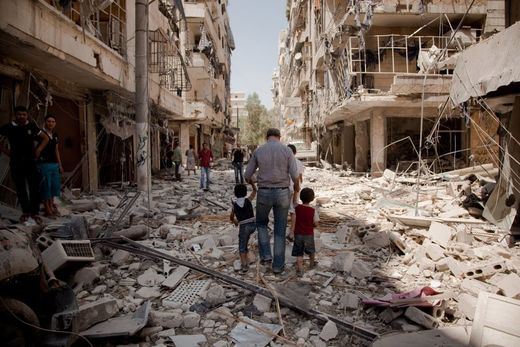There are more than 70,000 Iranian troops in Syria and some estimates are double that figure. These troops include militias that the Iranian regime brought in from throughout the region and whose expenses it pays for. They have been fighting to gain control of Aleppo and are now on the verge of doing that by destroying the east of the city. They are progressing under Russian bombardment that is targeting civilians, and have assigned the Assad regime’s planes with the task of dropping chemical bombs and chlorine gas in order to empty areas before advancing on and occupying them.
I’m not going to deny the possibility that Aleppo will fall or the impossibility of expelling ISIS from Raqqa, but I aim to clarify the true reality as opposed to the propaganda in Syria. This is because the war in Syria is deeper and more complex.
Even if the Iranians and Assad’s forces seize eastern Aleppo, Syria will not become stable and surrender to the regime that it has been fighting for five years because it will take many years for the regime to impose its presence and this is doubtful. This makes us wonder about the wisdom behind the actions of the Syrian regime’s allies – Iran and Russia. Do they intend to continue to support the regime on the ground with the same amount of force and incur losses during the future so that it stays in power? Do they prefer the war to continue for years over a political solution which would represent a mutual concession – a mixed regime composed of the old one and the opposition but without the current leadership?
What will the Iranians and Russians do after they have seized eastern Aleppo that has been ruined by crazy bombardment which has caused most of the population to leave? Will they spend 2017, which is fast approaching, fighting to take over the remaining Syrian towns including the Damascus countryside which is still partly under the control of the rebels?
What will happen after that? How will the Syrian regime rule a state that has been torn apart and is filled with fighters against it whilst its troops form only 30 per cent of the current forces? The other forces are made up of Iranian troops and militias brought over from Iraq, Lebanon, Afghanistan, Pakistan and elsewhere! Does Iran intend to keep foreign and sectarian militias in Syria during the coming years in order to stabilise Assad’s rule? There is no doubt that the presence of sectarian militias will be a magnet for more fighters from the region and the world and that the war will continue.
This is the dilemma that the regime in Iran discovered too late; if it is victorious and leaves, the regime in Damascus will fall. If it continues with its military presence, the war will continue with its costs and its internal dangers to the Iranian regime.
Why are the invaders overdoing the celebrations in the outskirts of Aleppo these days and giving the impression that the war is ending? This is because they need to raise morale within their own countries; Iran and Russia, and amongst the Lebanese Hezbollah’s militias, the Iraqi Asa’ib Ahl Al-Haq militias and others. The propaganda is directed at their people and the world who have been watching this conflict for a long time and who have failed to attain victory despite being heavily armed as opposed to the opposition that does not have quality weapons.
The Iranians are more aware than the Russians that they are involved in this failed war and that even if they win the current round, the war will continue and will finally force them to accept what they continue to oppose and fight against – a political solution. As for their Russian allies who see the fighting in Syria from the perspective of international conflict, they will have no objection to a sudden withdrawal, just as they entered suddenly without considering the consequences of that for Damascus and Tehran.
Current Iranian policy in the region seems different from that of the past; it seems as though the Iranians care about rapid gains, having previously been known to have a long-term strategy. We see this in Iran’s insistence on engaging in fighting in Iraq, Syria and Yemen as well, even though there is nothing in those countries that guarantees that the Iranians will achieve conclusive victories. The fighting in Syria will continue and peace will not be restored in Iraq because Iran is building sectarian forces. Likewise, the pro-Iranian group in Yemen, the Houthis, is too small to achieve victory in the conflict there, although it was able to bring about chaos.
Other countries in the region may not say anything about the defeat in Aleppo, but they know that the Syrian pit is deep and that Iran will not come out of it except by paying a high price.
Responsibility for the information and views set out in this article lies entirely with the author.


